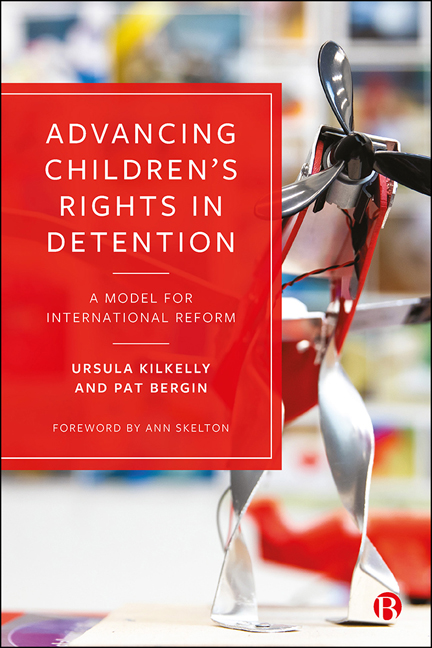Book contents
- Frontmatter
- Contents
- List of Cases and Instruments
- List of Figures
- About the Authors
- Acknowledgements
- Foreword
- Introduction
- 1 Children’s Rights in Detention
- 2 An International Perspective
- 3 Irish Youth Justice Law and Policy
- 4 Introducing Child Detention in Ireland
- 5 Oberstown and the Process of Change
- 6 Implementing Children’s Rights in Detention
- 7 Children’s Rights to Protection from Harm
- 8 Staff Wellbeing and Communication
- 9 International and National Influences and Advocacy
- 10 Reflections: Enablers and Barriers to Reform
- Afterword
- References
- Index
Foreword
Published online by Cambridge University Press: 13 May 2022
- Frontmatter
- Contents
- List of Cases and Instruments
- List of Figures
- About the Authors
- Acknowledgements
- Foreword
- Introduction
- 1 Children’s Rights in Detention
- 2 An International Perspective
- 3 Irish Youth Justice Law and Policy
- 4 Introducing Child Detention in Ireland
- 5 Oberstown and the Process of Change
- 6 Implementing Children’s Rights in Detention
- 7 Children’s Rights to Protection from Harm
- 8 Staff Wellbeing and Communication
- 9 International and National Influences and Advocacy
- 10 Reflections: Enablers and Barriers to Reform
- Afterword
- References
- Index
Summary
“We are safe here physically, everything is well, but we have stress all the time because every minute we have a dream that is being out of here with our families and friends” (Nowak, 2019, p105). These words of an adolescent boy, interviewed during the Global Study on Children Deprived of their Liberty, remind us that no matter how good the conditions of confinement might be, freedom remains the perpetual dream for every detained child. Manfred Nowak, who led the Global Study, equated children's deprivation of liberty with deprivation of childhood and he recommended that states ‘make all efforts to reduce the number of children held in places of detention and prevent deprivation of liberty before it occurs’ (Nowak, 2019, p 668). The Global Study accepts that in ‘rare’ cases, deprivation of liberty remains unavoidable, and if it is used, then it ‘should be in conditions and circumstances that ensure respect for the human rights of children’ (Nowak, 2019, p 257).
This book by Ursula Kilkelly and Pat Bergin gives a detailed account of how Ireland has grappled with developing a child-rights-compliant approach to caring for children deprived of their liberty. The authors acknowledge that, until a few years ago, Ireland's detention practices fell short of good practice, with inadequate standards of care, high levels of restrictive practices and ineffective responses to children's complex needs. The book explains how Ireland has made important changes during the past five years to bring its youth justice detention practices in line with international human rights standards pertaining to children. The story of Oberstown Children Detention Campus is a narrative of transformation that provides insights into the relevance of a purpose-built facility. It demonstrates the vital importance of professionalizing the workforce, and reshaping the way that they work with children, which in turn has a significant impact on outcomes for children.
Article 40(1)) of the United Nations Convention on the Rights of the Child (CRC) requires that children in the youth justice system must be ‘treated in a manner consistent with the child's sense of dignity and worth’. This requirement is both profound and simple, but it is not always easy to achieve in practice, particularly in places of detention where imposed communal living in confined and impersonal spaces seems to pull in the very opposite direction.
- Type
- Chapter
- Information
- Advancing Children's Rights in DetentionA Model for International Reform, pp. ix - xiiPublisher: Bristol University PressPrint publication year: 2021



